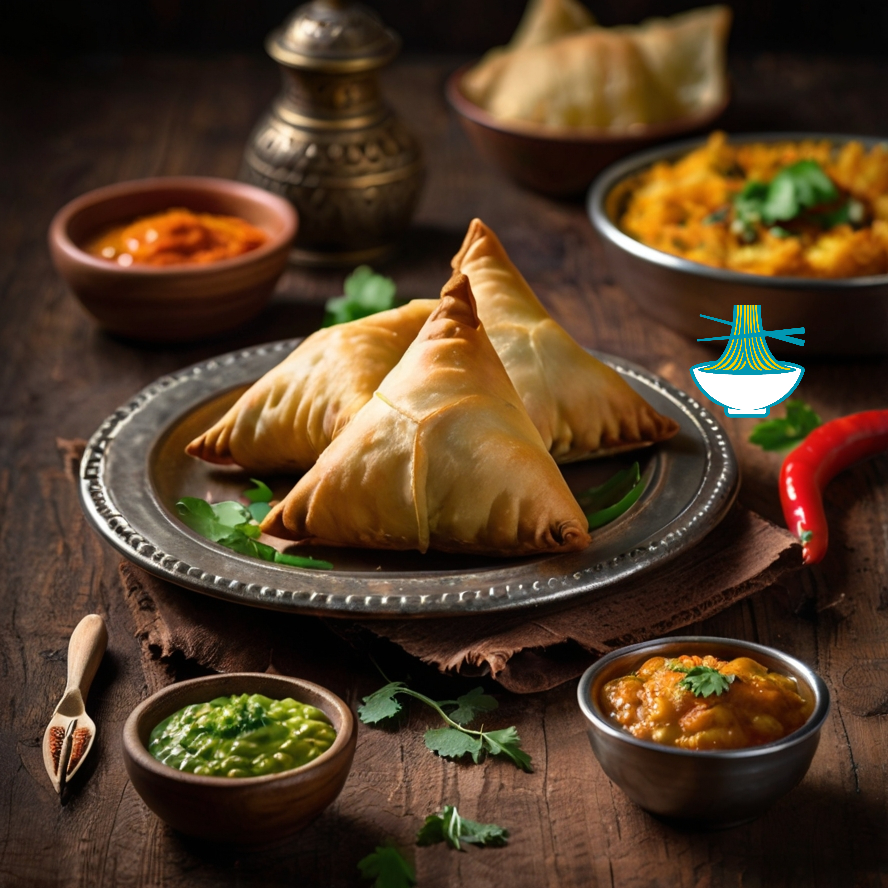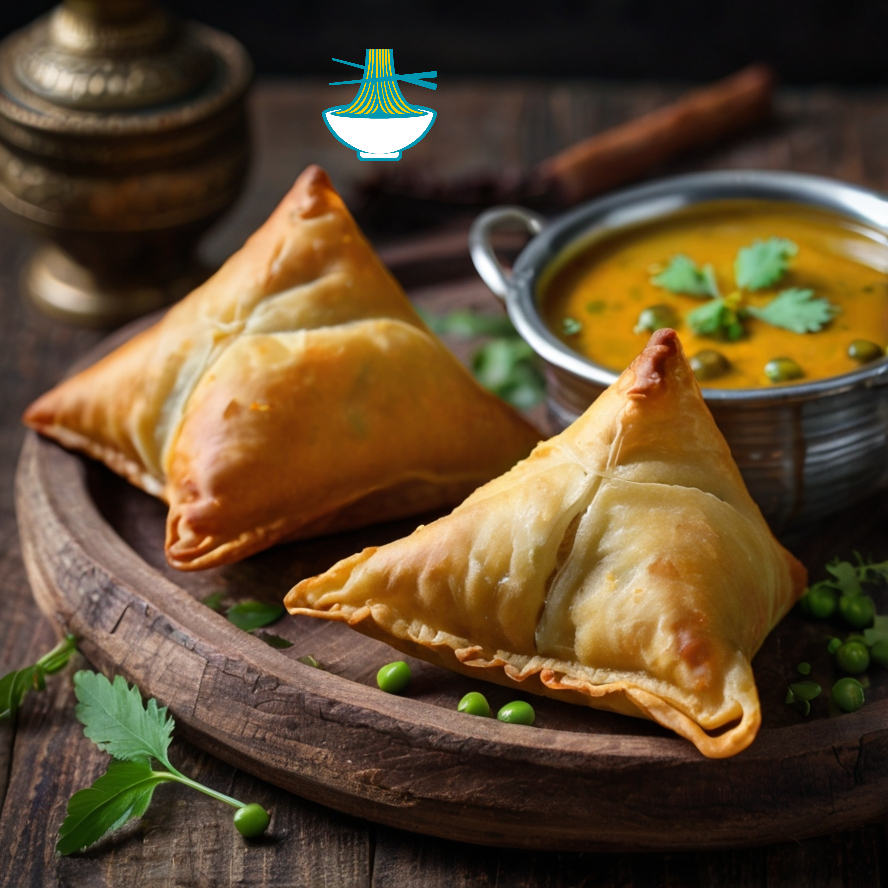Discover how to make the perfect samosa with this easy-to-follow recipe. Whether you prefer them fried or baked, these golden, crispy pastries are filled with a flavorful mixture of spiced potatoes, peas, and your choice of meat. Ideal for appetizers, snacks, or party treats, this recipe provides step-by-step instructions and tips to achieve a delicious, authentic samosa experience.
Ingredients:
For the Filling:
- 2 large potatoes, peeled and diced
- 1 cup frozen peas
- 1/2 cup minced meat (optional)
- 1 medium onion, finely chopped
- 2 tablespoons vegetable oil
- 1 teaspoon cumin seeds
- 1 teaspoon mustard seeds
- 1 teaspoon turmeric powder
- 1 teaspoon garam masala
- 1 teaspoon ground coriander
- 1/2 teaspoon chili powder (adjust to taste)
- Salt to taste
- 2 tablespoons chopped fresh cilantro
- Juice of 1 lemon
For the Dough:
- 2 cups all-purpose flour
- 1/4 cup vegetable oil
- 1/2 teaspoon salt
- Water, as needed
Instructions:
Prepare the Filling:
- Heat the vegetable oil in a pan over medium heat. Add cumin seeds and mustard seeds, and let them sizzle for a few seconds.
- Add chopped onions and sauté until they turn golden brown.
- Add minced meat (if using) and cook until browned. Break it up into small pieces as it cooks.
- Add turmeric powder, garam masala, ground coriander, chili powder, and salt. Stir well.
- Add diced potatoes and peas. Mix thoroughly.
- Cover and cook until potatoes are tender. Stir occasionally. Once cooked, stir in chopped cilantro and lemon juice. Set aside to cool.
Prepare the Dough:
- In a large bowl, mix the flour, salt, and vegetable oil.
- Gradually add water, mixing until a smooth, elastic dough forms. Cover with a damp cloth and let it rest for 30 minutes.
Assemble the Samosas:
- Divide the dough into small balls and roll each ball into a thin circle.
- Cut each circle in half to form semi-circles. Fold each semi-circle into a cone shape and seal the edge with a little water.
- Fill each cone with the prepared filling, then seal the open edge by pinching it together to form a triangular shape.
Cooking Options:
- Frying: Heat oil in a deep pan or fryer to 350°F (175°C). Fry the samosas in batches until golden brown and crispy, about 4-5 minutes per batch. Drain on paper towels.
- Baking: Preheat the oven to 400°F (200°C). Place the samosas on a baking sheet lined with parchment paper. Brush lightly with oil and bake for 20-25 minutes, or until golden brown and crispy.
5. Serve: Enjoy your samosas hot with your favorite chutneys or sauces.
Nutritional Values
2 Large Potatoes (peeled and diced)
- Calories: 290
- Carbohydrates: 67 grams
- Protein: 7 grams
- Fat: 0 grams
Benefits:
- Rich in vitamins C and B6.
- High in fiber, supporting digestive health.
1 cup Frozen Peas
- Calories: 115
- Carbohydrates: 21 grams
- Protein: 8 grams
- Fat: 0.5 grams
Benefits:
- High in protein and fiber.
- Provides vitamins A, C, K, and several B vitamins.
1/2 cup Minced Meat (optional)
- Calories: 250
- Carbohydrates: 0 grams
- Protein: 20 grams
- Fat: 20 grams
Benefits:
- Provides high-quality protein and essential nutrients like iron and vitamin B12.
1 Medium Onion (finely chopped)
- Calories: 45
- Carbohydrates: 11 grams
- Protein: 1 gram
- Fat: 0 grams
Benefits:
- Rich in antioxidants and vitamin C.
- Supports heart health and has anti-inflammatory properties.
2 tablespoons Vegetable Oil
- Calories: 240
- Carbohydrates: 0 grams
- Protein: 0 grams
- Fat: 28 grams
Benefits:
- Provides necessary fats for cooking.
- Adds flavor and helps in cooking the filling.
Cumin Seeds (1 teaspoon)
- Calories: 8
- Carbohydrates: 1 gram
- Protein: 0.5 grams
- Fat: 0.5 grams
Benefits:
- Contains antioxidants and supports digestion.
- Provides iron and may aid in metabolism.
Mustard Seeds (1 teaspoon)
- Calories: 7
- Carbohydrates: 0.5 grams
- Protein: 0.5 grams
- Fat: 0.5 grams
Benefits:
- Contains beneficial fatty acids and antioxidants.
- Supports digestion and may have anti-inflammatory effects.
Turmeric Powder (1 teaspoon)
- Calories: 8
- Carbohydrates: 1.5 grams
Benefits:
- Contains curcumin, which has anti-inflammatory and antioxidant properties.
- May support joint health and cognitive function.
Garam Masala (1 teaspoon)
- Calories: 6
- Carbohydrates: 1 gram
- Protein: 0.5 grams
- Fat: 0.3 grams
Benefits:
- Adds flavor and aroma to dishes.
- Contains a blend of spices that provide antioxidants and aid in digestion.
Ground Coriander (1 teaspoon)
- Calories: 6
- Carbohydrates: 1 gram
- Protein: 0.5 grams
- Fat: 0.3 grams
Benefits:
- Contains antioxidants and supports digestive health.
- May help with inflammation and blood sugar control.
Chili Powder (1/2 teaspoon)
- Calories: 3
- Carbohydrates: 0.5 grams
Benefits:
- Contains capsaicin, which can boost metabolism and improve circulation.
- Adds heat and flavor to the filling.
Salt (to taste)
- Sodium: 1,150 mg per ½ teaspoon
Benefits:
- Enhances flavor but should be used in moderation to manage sodium intake.
Chopped Fresh Cilantro(2 tablespoons)
- Calories: 1
- Carbohydrates: 0.2 grams
Benefits:
- Provides antioxidants and supports digestion.
- Adds a fresh flavor to the filling.
Juice of 1 Lemon
- Calories: 12
- Carbohydrates: 4 grams
Benefits:
- Rich in vitamin C, which supports the immune system.
- Adds a tangy flavor and aids in digestion.
2 cups All-Purpose Flour
- Calories: 910
- Carbohydrates: 190 grams
- Protein: 16 grams
- Fat: 2 grams
Benefits:
- Provides a base for many recipes.
- Source of energy through carbohydrates.
Vegetable Oil ( 1/4 cup)
- Calories: 240
- Carbohydrates: 0 grams
- Protein: 0 grams
- Fat: 28 grams
Benefits:
- Provides necessary fats for cooking.
- Helps in making the dough tender and pliable.
Salt (1/2 teaspoon)
- Sodium: 1,150 mg
Benefits:
- Enhances flavor and helps in dough formation.
Water (as needed)
- 0 calories
Benefits:
- Essential for hydration and to adjust the dough consistency.
This breakdown includes the nutritional values and benefits of each ingredient used in the filling and dough for a comprehensive understanding of their contributions to the recipe.


Comments